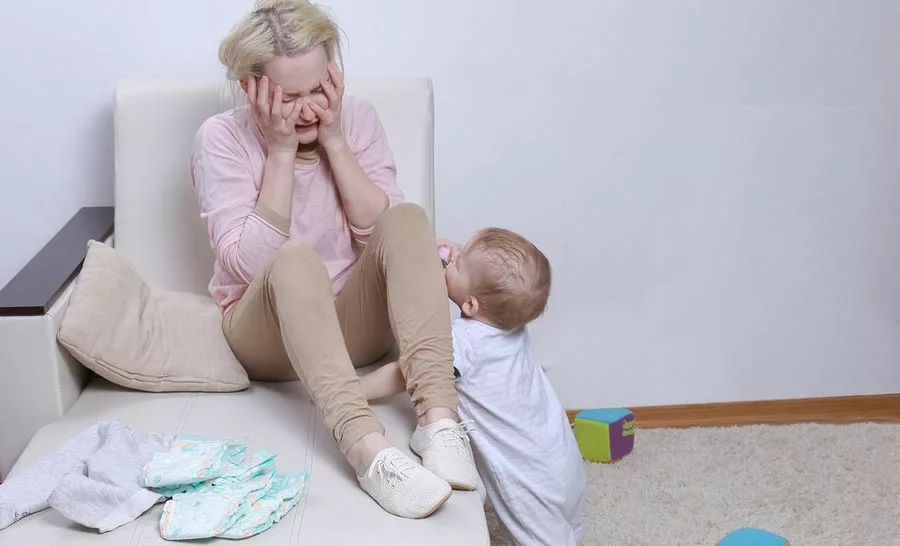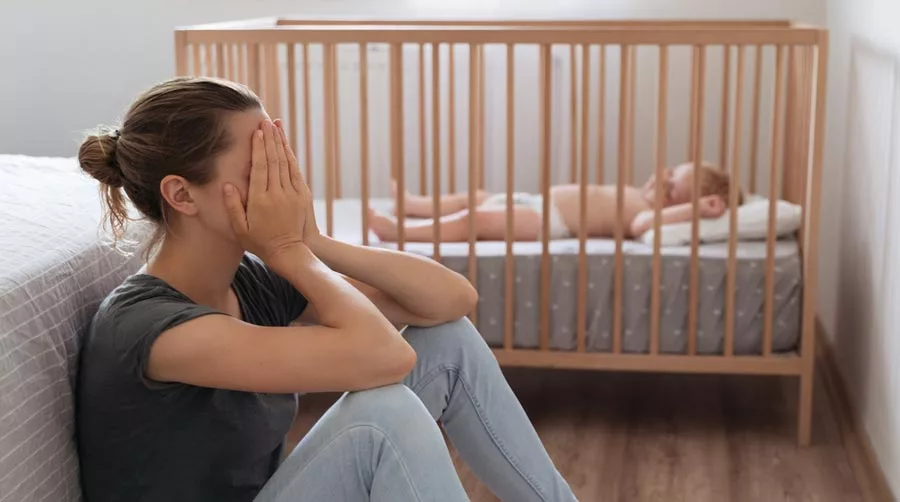Postpartum Depression Symptoms: What to Do About The Baby Blues
Becoming a parent is an incredible blessing, but it can also be an overwhelming and challenging experience, especially for new mothers. While physical recovery from childbirth is expected, many mothers face postpartum mental health issues that make adjusting to parenthood far more difficult than anticipated.
These issues may range from the common and temporary baby blues to postpartum depression, anxiety, bipolar disorders, or even post-traumatic stress disorder. The emotional strain of this transition can take a toll on a mother’s well-being and her ability to care for her child.
Fortunately, help is available so you don’t have to go through this alone. With support and effective treatment options, it’s possible to recover and once again bask in the joy that comes with being a parent.
Keep reading to learn more about postpartum depression, mood disorders, and other mental illnesses, and how you can get assistance from Catalina Behavioral Health during the postpartum period if needed.
24 Hour Mental Health Treatment
What are the Different Types of Postpartum Mood Disorders?
While many new parents sail through the first few weeks with ease, some find themselves struggling to cope with their newfound responsibilities. It’s important to learn about the potential postpartum mood disorders a new parent can face.
Postpartum Blues or Baby Blues
Postpartum blues, also known as baby blues, affects 50-75% of people post-delivery. Symptoms typically start in the first week after delivery and subside within two weeks without treatment. They include:
- Prolonged bouts of crying
- Feelings of sadness and anxiety
- Irritability
- Fatigue
- Difficulty concentrating or making decisions
- Having trouble falling asleep
- Having trouble staying asleep
- Feeling that nothing will ever be the same
- Not feeling like yourself
- Feeling very nervous around the baby
Despite its name, postpartum blues does not always occur immediately after birth; it can happen anytime during the first three months after delivery.
There is no single cause for it but research suggests that hormonal changes play a role in its onset. Other possible triggers include physical exhaustion from labor and delivery, stress from adapting to life with a newborn, and financial worries associated with having a baby. It’s important to note that while uncomfortable and overwhelming at times, postpartum blues will usually go away on their own in no more than two weeks without treatment.
Postpartum Depression & Postpartum Depression Symptoms

Postpartum depression affects 1 in 7 new parents and is more serious than the baby blues. Symptoms range from mild to severe and can appear within a week of delivery or up to one year afterward. They include:
- Frequent crying
- Irritability
- Fatigue
- Guilt
- Anxiety
- Difficulty caring for baby or self
- Thoughts of harming the baby
- Thoughts of suicide
- Loss of interest in activities previously enjoyed
- Severe depression feelings that feel similar to symptoms of major depressive disorder
Postpartum disorders are thought to be caused by a combination of hormonal shifts after childbirth as well as psychological factors such as stress or trauma during pregnancy or childbirth (or both).
Treatment may include medication with antidepressant medications and mood stabilizers, along with talk therapy sessions to address underlying issues related to relationships or parenting concerns.
Postpartum Psychosis
Postpartum psychosis is a rare and severe form of postpartum depression. According to Postpartum Support International, it affects approximately 1 to 2 in 1,000 people after delivery.
Postpartum psychosis can manifest itself in a variety of ways. Common symptoms include agitation, confusion, feelings of hopelessness and shame, insomnia, paranoia, delusions or hallucinations, hyperactivity, and rapid speech or mania.
These symptoms can vary from person to person, but one thing remains consistent—postpartum psychosis is a serious mental health condition that requires immediate medical attention.
Potential Risks Associated With Postpartum Psychosis
Postpartum psychosis carries a high risk for suicide as well as harm to the baby due to psychotic episodes. Many people experience extreme paranoia that causes them to fear that their baby may be at risk of harm from someone else or even themselves.
Consequently, it’s important that anyone experiencing postpartum psychosis symptoms receives immediate medical attention so that they can be properly evaluated and treated. Treatments may include hospitalization for stabilization and monitoring as well as psychotherapy to address underlying psychological issues and medication management if necessary.
Postpartum Bipolar Disorder (PPBD)

Postpartum bipolar disorder is a mental illness that affects new mothers and can have serious consequences for both the mother and her child. It’s often misdiagnosed, so it’s important to understand what postpartum bipolar disorder is and how to recognize it.
Postpartum bipolar illness is characterized by extreme mood swings that typically begin in the days or weeks following giving birth. These shifts can be severe enough to cause mania and hypomania episodes, which can last anywhere from 4-7 consecutive days.
Mania is typically characterized by psychosis (i.e., delusions or hallucinations), functional impairment, and extreme euphoria, and hypomania tends to be less intense and often manifests as increased energy, talkativeness, and productivity. Both manic and hypomanic episodes are usually observable in other people.
Women who experienced peripartum bipolar disorder, major depression, mood episodes, or other mental health struggles before pregnancy are at higher risk for postpartum bipolar disorder.
The Consequences of Misdiagnosis
Misdiagnosis can have serious consequences for both mothers and children. Insecure attachment between the mother and her child can lead to poor cognitive performance in the child as well as increased rates of infanticide among women with PPBD who are not properly diagnosed or treated.
Suicide rates among women with PPBD who are not properly diagnosed or treated are also higher than among those with PPD who are correctly diagnosed and treated early on. This underscores the importance of understanding symptoms and getting proper treatment as soon as possible if you suspect you may have PPBD.
Immediate Help for Mental Health Treatment
Treating Postpartum Bipolar Disorder
It is important for those who are experiencing symptoms of postpartum bipolar disorder to seek help from an experienced mental health professional as soon as possible. A mental health treatment provider will be able to diagnose this psychiatric illness based on an assessment of your symptoms and provide you with appropriate treatment options that may include psychotherapy, medication management, or a combination of both.
Treatment should focus on helping you manage your current symptoms while also addressing any underlying issues that may have contributed to the development of the postpartum bipolar disorder.
Coping With Postpartum Bipolar Disorder
In addition to seeking professional help for your condition, there are also several lifestyle changes you can make to help cope with the symptoms of postpartum bipolar disorder. For example, try to maintain a regular sleep schedule that allows for at least seven hours of sleep each night; get plenty of physical exercises; practice mindfulness or relaxation techniques; eat healthy meals; and limit caffeine intake.
Additionally, it is important to build a strong support system made up of family members and friends who can provide emotional support during difficult times.
Who Is At Risk For Postpartum Depression?

There are many risk factors for developing PPD. Some of the most common and predictive ones include the following.
Depression During Pregnancy – Pregnant women who have depressive symptoms while pregnant should be screened and treated as needed. Depression during pregnancy seems to be the strongest predictor for later suffering from postpartum depression.
Prenatal Anxiety – Prenatal anxiety has also been found to be associated with an increased risk of developing postpartum depression.
History of Previous Depression – Although not as strong a predictor as depressive episodes during the pregnancy, it appears that women with histories of depression previous to conception are also at a higher risk for developing postpartum depression.
Family History – Having a family history of bipolar, depression, or other mood disorders and mental disorders is a significant risk factor for developing postpartum depression/ maternal depression.
Maternity Blues – Up to 80% of women experience some form of ‘the blues’ after giving birth (hence the name). The blues typically start around day 3 postpartum and resolve within 2 weeks without intervention.
However, especially when severe, the blues may lead to the onset of postpartum depression. If you are experiencing the blues after giving birth, please reach out to your doctor or a mental health professional so they can help you determine if what you are experiencing is normal or if it may be something more serious like PPD.
Recent Stressful Life Events – Women who have experienced stressful life events leading up to or during their pregnancy are at an increased risk for developing postpartum depression. Some examples of stressful life events include job loss, divorce/separation, death in the family, financial difficulties, etc.
Inadequate Social Supports – Women who do not have adequate social support systems are also at an increased risk for developing postpartum depression. It is important to have people in your life that you can rely on for emotional support (e.g., partner/spouse, family member, friend). If you do not have anyone in your life that you can turn to for support, there are many community resources available (e.g., Mother’s groups/support groups).
Poor Marital Relationship – One of the most consistent findings across studies is that women who report marital dissatisfaction prior to childbirth are at an increased risk for developing postpartum depression and need treatment. If you are unhappy in your marriage/relationship and feel like you do not have anyone to talk to about it, consider contacting a therapist or counselor who can help you work through these feelings before they become overwhelming and lead to PPD.
If you have a history of depression and are thinking about becoming pregnant or are already pregnant, it’s a good idea to reach out to your doctor or a mental health professional so that they can help you create a treatment plan.
How Partners, Family, and Friends Can Help

While seeking professional help is the best way to address postpartum depression and other postpartum mood disorders, there are plenty of ways that partners, family members, and friends can lend a helping hand to their loved ones who may be struggling.
Postpartum Mental Health Essentials
Be Supportive and Understanding
The most important thing you can do for someone who is dealing with postpartum mood disorders is to offer them support and understanding. This means being patient, listening without judgment, and respecting your loved one’s feelings.
Let them know that you’re there for them if they ever need to talk or need any help around the house. Not only will this support provide a sense of comfort, but it will also give your loved one an outlet for expressing their feelings without fear of judgment or criticism.
Help With Day-to-Day Tasks
Taking care of a new baby can be incredibly challenging — especially if your loved one is struggling with postpartum depression or anxiety. Offering to help out with day-to-day tasks such as grocery shopping, meal preparation, or cleaning up around the house can go a long way in providing some relief from the stressors associated with parenting.
Even something as simple as cooking dinner or watching the baby while your loved one takes a nap can provide much-needed respite during those early days after giving birth.
Take Care of Yourself Too
It’s important to remember that caring for someone else can take an emotional toll on you, too. Make sure that you are taking care of yourself both physically and mentally by getting enough rest and engaging in activities that bring you joy like exercising, reading books, going for walks outdoors, and anything else that you like doing.
Taking time for yourself not only helps reduce stress but will also make it easier for you to be emotionally present when offering support to your loved one who may be struggling emotionally after giving birth.
Licensed Drug Addiction Treatment
Get Help with Postpartum Depression and Other Postpartum Disorders
At Catalina Behavioral Health, we specialize in providing effective treatment for those suffering from postpartum depression and other related conditions.
Our team of highly trained professionals has extensive experience in treating these types of conditions and will work with you to develop an individualized plan that fits your needs and lifestyle.
We offer evidence-based treatments such as cognitive behavioral therapy (CBT) which have been proven to be effective in treating mental health issues during the postpartum period. In addition to CBT, we also provide medication management services if necessary to help ensure optimal outcomes for our patients.
Join a Welcoming Environment for Health and Recovery
At Catalina, we understand that getting help for a postpartum mood disorder can be an intimidating prospect so we strive to create a warm and supportive environment where our patients feel safe sharing their experiences without judgment or stigma attached. Our team works hard to ensure that every patient receives the best care possible regardless of their individual circumstances or diagnosis.
If you or someone you know is struggling with postpartum mental health issues such as postpartum depression or anxiety, know that help is available at Catalina Behavioral Health. Contact us to learn more about potential treatments and how we can help.
All calls to our facility are confidential, so please reach out with confidence and get options to help lift your life and mood today!







